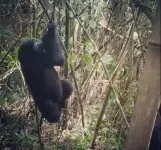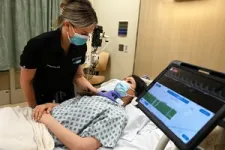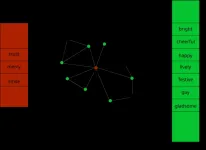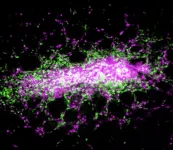(Press-News.org) Great apes spinning behaviours could provide clues about the role of altered states for the origins of the human mind.
Online videos observed great apes spin themselves to deliberately make themselves dizzy.
Researchers say these new findings suggest that the behaviour could be used to understand when humans evolved the desire to seek altered mental states and actively manipulate their mood and perception of reality.
Great apes deliberately spin themselves in order make themselves dizzy, academics at the University of Warwick and the University of Birmingham have discovered.
The findings could provide clues about the role of altered mental states for origins of the human mind.
Dr Adriano Lameira, Associate Professor of Psychology at The University of Warwick who co-led the study said: “Every culture has found a way of evading reality through dedicated and special rituals, practices, or ceremonies. This human trait of seeking altered states is so universal, historically, and culturally, that it raises the intriguing possibility that this is something that has been potentially inherited from our evolutionary ancestors.
“If this was indeed the case, it would carry huge consequences on how we think about modern human cognition capacities and emotional needs.”
The research team came across a viral video of a male gorilla spinning in a pool, and as they continued researching YouTube, came across more videos of gorillas, chimpanzees, bonobos, and orangutans all engaging in spinning behaviours.
Through analysing over 40 online videos, the researchers found that on average the primates revolved 5.5 times per episode of spinning, with the average speed 1.5 revolutions per second and the primates did this on average three times.
Researchers compared great ape spinning speeds and found that they can spin while holding on a rope as fast as professional human dancers and circus artists, as well as Dervish muslims who take part in whirling ceremonies to achieve a spiritual trance.
Dr Lameira explained: “Spinning alters our state of consciousness, it messes up with our body-mind responsiveness and coordination, which make us feel sick, lightheaded, and even elated as in the case on children playing in merry-go-rounds, spinner-wheels, and carousels.
“What we wanted to try to understand through this study is whether spinning can be studied as a primordial behaviour that human ancestors would have been able to autonomously engage in and tap into other states of consciousness. If all great apes seek dizziness, then our ancestors are also highly likely to have done so.
“We asked ourselves what role these behaviours play when it comes to the origins of the human mind.
“The apes were doing this purposefully, almost as if they were dancing – a known mechanism in humans that universally facilitates mood regulation, social bonding and heightens the senses and is based on rotation movements. The parallel between what the apes were doing and what humans do was beyond coincidental.”
In many of the videos, the primates were using ropes or vines to spin, and it was in these videos where they were spinning the fastest and for the longest amounts of time.
The research team analysed the videos and compared it to videos of purposeful human pirouettes, for example, ballet dancing, traditional Hopak dancing, whirling dervishes and aerial silks performances.
The team then self-experimented spinning at these speeds and times and found it difficult to achieve the third bout of spins at these speeds, as great apes did. Apes were noticeably dizzy at that point in the videos, and they were likely to lose their balance and fall down.
“This would indicate that the primates deliberately keep spinning, despite starting to feel the effects of dizziness, until they are unable to keep their balance any longer.” explained Dr Marcus Perlman, Lecturer at the Department of English Language and Linguistics of The University of Birmingham who co-led of the research.
Previous studies which attempted to understand human motivation for self-inducing dizziness focused on substance use such as alcohol or drugs, but it is uncertain whether these or other substances would have been accessible to human ancestors, either because those substances were not available in their environment or because individuals and communities didn’t have the technical and cultural knowledge to produce or process psychoactive substances. Scientists say this new study could be more relevant to explain the role of altered states on the evolution of the human mind.
“The further back in human history you look, the less certain we can be about the role that substance-induced experiences played in our evolution. It’s not clear whether our ancestors had access to mind altering substances, or if they had the tools and knowledge to create the substance.
“For example, people may have had access to grapes, but you cannot assume they have the tools or the knowledge to create wine,” Dr Lameira explained.
Scientists say that further research is needed to understand primates’ motivations for engaging in these behaviours, to understand why our own ancestors might also have been driven to seek out these spinning and mind-altering experiences.
Dr Lameira adds: “There could be a link to mental health here, as the primates we observed engaging in this behaviour were mostly captive individuals, who may be bored and trying to stimulate their senses in some way.
“But it could also be a play behaviour. If you think about a child’s playground, almost all the playground apparatus – swings, slides, seesaws and roundabouts or merry-go-rounds – they are all designed to challenge your balance or disrupt the body-mind responses.
“There are some interesting parallels that should be investigated further, in order to understand why people are motivated to engage in these behaviours. It could very well be that we have been seeking and engaging in mind-altering experiences before we were even modern humans.”
The paper, 'Great apes reach momentary altered mental states by spinning', is published in Primates.
ENDS
Notes to editors
DOI: 10.1007/s10329-023-01056-x
If you would like to see a copy of the paper, please contact the University of Warwick / University Of Birmingham press office using the contact information below.
Media contacts
Natalie Gidley, University of Warwick, E: natalie.gidley@warwick.ac.uk M: +44 (0) 7824540791
Tony Moran, University of Birmingham E: t.moran@bham.ac.uk M: +44 (0)782 783 2312 or out-of-hours E: pressoffice@contacts.bham.ac.uk M: +44 (0) 121 414 2772
END
Dizzy apes provide clues on human need for mind altering experiences
2023-03-14
ELSE PRESS RELEASES FROM THIS DATE:
Mediterranean diet associated with decreased risk of dementia
2023-03-14
Eating a traditional Mediterranean-type diet – rich in foods such as seafood, fruit, and nuts – may help reduce the risk of dementia by almost a quarter, a new study has revealed.
Experts at Newcastle University found that individuals who ate a Mediterranean-like diet had up to 23% lower risk for dementia than those who did not.
This research, published today in BMC Medicine, is one of the biggest studies of its kind as previous studies have typically been limited to small sample sizes and low numbers ...
Gene essential to making DNA appears to be a good target in minimizing pulmonary hypertension
2023-03-14
AUGUSTA, Ga. (March 14, 2023) – The vascular smooth muscle cells that normally give blood vessel walls strength and flexibility proliferate and become destructive in pulmonary hypertension, a typically rapidly progressing condition that makes it hard to get blood inside our lungs and oxygen to our bodies.
Now scientists have found that inhibiting a gene essential to making DNA so the cells can take on this uncharacteristic growth, can significantly reduce the destructive cell proliferation and disease progression, they report in the European Heart Journal.
The findings point toward a ...
Endometriosis: how to diagnose and manage this complex condition
2023-03-14
Endometriosis is a painful, complex condition affecting about 1 in 10 women of reproductive age, but it is poorly understood. A new clinical review published in CMAJ (Canadian Medical Association Journal) https://www.cmaj.ca/lookup/doi/10.1503/cmaj.220637 provides an overview of the causes, diagnosis and management of endometriosis based on the latest evidence, to help clinicians and patients.
The review is timely, as March is Endometriosis Awareness Month.
Endometriosis, defined as the presence of endometrial-like tissue outside the uterus, is one of the most common gynecologic conditions. It is estimated to affect approximately 1 million women ...
California schools are not immune to political attacks
2023-03-14
A new analysis by researchers at UCLA and UC Riverside shows that even in Blue state California, political attacks on public schools are pervasive and growing, hindering learning and the role schools play in a diverse democracy. Political division and community-level conflict is negatively impacting student interactions, and many California students are experiencing hostility and intolerance in school. Troublingly, the research finds high levels of hostile comments toward LGBTQ students, and racist remarks targeting Latino, and in particular, African American ...
El Camino Health is first in the world to adopt FloPatch advanced ultrasound technology for sepsis management
2023-03-14
El Camino Health is the first health system in the world to adopt FloPatch, an innovative new technology that monitors blood flow in real time. Developed by Flosonics Medical, FloPatch is the world’s first wireless, wearable Doppler ultra-sound system that helps clinicians better manage intravenous (IV) fluid therapy earlier in the sepsis care pathway.
“Timing is crucial when caring for patients with sepsis. Our nurses have seen firsthand how effective FloPatch is in monitoring the effectiveness of treatment in deteriorating patients, especially those with sepsis and low blood pressure,” said Cheryl Reinking, chief nursing officer at El Camino Health. “We ...
Scientists reveal a potential new approach to treating liver cancer
2023-03-13
Scientists reveal a potential new approach to treating liver cancer
Results in cell and mouse studies may have implications for the development of a new class of anticancer drugs
Scientists at the National Institutes of Health and Massachusetts General Hospital in Boston have uncovered a potential new approach against liver cancer that could lead to the development of a new class of anticancer drugs. In a series of experiments in cells and mice, researchers found that an enzyme produced in liver cancer ...
City of Hope scientists reveal how XBP1s interacts with IL-15 to enhance the survival of natural killer cells
2023-03-13
FINDINGS
A new study published in Science Immunology points to a promising therapeutic approach for future cancer treatments based on natural killer cells (NK), which are immune cells that bind to tumor cells and destroy them.
City of Hope scientists created a knockout mouse model for a protein called XBP1s to explore the molecule’s effect on NK cells and its role in fighting cancer. Earlier studies showed that XBPIs strengthened the survival of NK cells, but precisely how was unclear.
The team identified a previously unknown mechanism in which interleukin-15 (IL-15) — a protein naturally ...
Unique image obtained by Brazilian scientists with high-speed camera shows how lightning rods work
2023-03-13
With a high-speed camera and the luck of being in the right place at the right time, physicist Marcelo Saba, a researcher at Brazil’s National Space Research Institute (INPE), and PhD candidate Diego Rhamon obtained a unique image of lightning strikes showing details of the connections to nearby buildings.
The image is so special that it appeared on the cover of the 28 December 2022 issue of Geophysical Research Letters (GRL) – one of the most important scientific journals in the field –, which featured an article with Saba as first author. ...
A new and better way to create word lists
2023-03-13
Word lists are the basis of so much research in so many fields. Researchers at the Complexity Science Hub have now developed an algorithm that can be applied to different languages and can expand word lists significantly better than others.
Many projects start with the creation of a word list. Not only in companies when mind maps are created, but also in all areas of research. Imagine you want to find out on which days people are in a particularly good mood by analyzing Twitter postings. Just looking for the word "happy" wouldn't be enough.
Instead, you would have to use an algorithm that detects all tweets that indicate that someone is happy. "So ...
The immune system does battle in the intestines to keep bacteria in check
2023-03-13
Yersinia bacteria cause a variety of human and animal diseases, the most notorious being the plague, caused by Yersinia pestis. A relative, Yersinia pseudotuberculosis, causes gastrointestinal illness and is less deadly but naturally infects both mice and humans, making it a useful model for studying its interactions with the immune system.
These two pathogens, as well as a third close cousin, Y. enterocolitica, which affects swine and can cause food-borne illness if people consume infected meat, have many traits in common, particularly their knack for interfering with the immune system’s ability to respond to infection.
The plague pathogen is blood-borne and transmitted by infected ...







